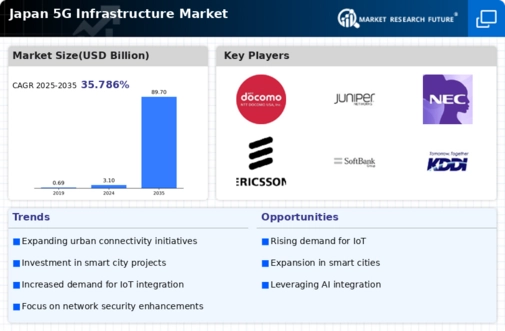Increased Adoption of IoT Devices
The proliferation of IoT devices in Japan is significantly influencing the 5G infrastructure market. As of 2025, it is estimated that there are over 1 billion connected IoT devices in the country, creating a substantial demand for robust and reliable network infrastructure. This surge in IoT adoption necessitates the deployment of advanced 5g networks capable of supporting massive data traffic and low-latency communication. Consequently, telecommunications companies are investing heavily in expanding their 5g infrastructure to accommodate this growing ecosystem. The integration of IoT with 5g technology is likely to unlock new business opportunities and enhance operational efficiencies across various sectors.
Government Initiatives and Support
The Japanese government actively promotes the development of the 5G infrastructure market through various initiatives and policies. This includes substantial funding and incentives aimed at enhancing network capabilities and expanding coverage. In 2025, the government allocated approximately $2 billion to support 5g deployment in rural areas, aiming to bridge the digital divide. Such initiatives are expected to stimulate private sector investment, thereby accelerating the growth of the 5g infrastructure market. Furthermore, the government's commitment to digital transformation aligns with its broader economic strategies, which could potentially lead to a more robust and competitive telecommunications landscape.
Rising Demand for High-Speed Connectivity
The demand for high-speed connectivity in Japan is surging, driven by the increasing reliance on digital services and applications. As of 2025, approximately 80% of Japanese households are reported to have access to 5g networks, reflecting a significant shift in consumer expectations. This rising demand is not only limited to individual users but also extends to businesses seeking to leverage advanced technologies such as IoT and AI. Consequently, the 5G infrastructure market is poised for substantial growth, as service providers strive to enhance their offerings and meet the evolving needs of consumers and enterprises alike.
Competitive Landscape Among Telecom Operators
The competitive landscape among telecom operators in Japan is intensifying, driving innovation and investment in the 5G infrastructure market. Major players are engaged in aggressive strategies to capture market share, including partnerships, mergers, and technological collaborations. In 2025, it is projected that the market will witness a 15% increase in investment from telecom operators as they strive to enhance their 5g offerings. This competition not only fosters innovation but also leads to improved service quality for consumers. As operators race to deploy advanced 5g networks, the overall growth of the 5g infrastructure market is likely to accelerate, benefiting both businesses and end-users.
Technological Advancements in Telecommunications
Technological advancements play a crucial role in shaping the 5G infrastructure market in Japan. Innovations in network architecture, such as the deployment of small cells and beamforming technologies, are enhancing the efficiency and performance of 5g networks. In 2025, it is estimated that over 50% of mobile operators in Japan have adopted advanced network slicing techniques, allowing for tailored services to meet diverse user requirements. These advancements not only improve user experience but also optimize resource allocation, thereby driving the growth of the 5g infrastructure market. The continuous evolution of technology suggests a promising future for telecommunications in Japan.
















